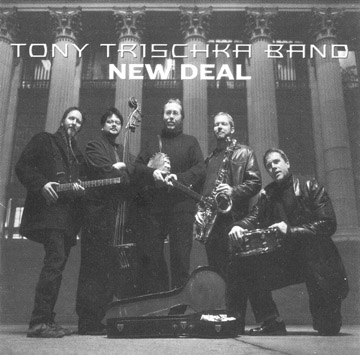Folk Fusion

September 25, 2003
What do you get when you combine a banjo, acoustic bass, drums, tenor sax, and guitar? Certainly not the acoustic guitar-toting soloists or duos that one normally comes to expect. The Tony Trischka Band is a bastard child of folk containing elements of country, blues, and jazz. Made up of Tony Trischka, Robert Emmet Bowen III, Rolf Sturm, Michael Amendola, and Scott Neumann, this group was only one of the more unusual acts that came to the Sixth Annual Boston Folk Festival this year.
Coming off of Rounder Records is their most recent album, “New Deal.” The band has been in existence since the mid-1990s but has changed line-ups several times to create an eclectic, eccentric mix of music that falls outside and inside the now blurred genre boundaries. One of the members of the band described their style of music, “It’s not the kind of music that there’s a game plan for. If I were in an R&B band I’d know what to do.”
“New Deal” contains a little bit of something for everyone. For that Appalachian taste, the banjo adds a country-twang twist to the tunes while the acoustic bass brings a darker, bluesier feel to the music. Phish’s Mike Gordon says of the album, “I was instantly mesmerized – not because of his technical prowess or innovative style, but because of his willingness to journey into scary, unpredictable territory.”
In “Northern Falling,” vocalist Jennifer Kimball drops in to relay a story of soldiers gone to war and mothers left to wonder where their sons are. Yet, the emphasis is more on the instrumental than the vocal to give the listener a feel for the story. Interestingly enough, Kimball’s backing harmony is completely improvised although it doesn’t have the usual repetitious feel to it that most her harmonies do.
“Hand Me My Banjo Down” showcases the vocals of Loudon Wainwright, done in the story-telling style popular to folk music. A lad marches up to Tennessee complaining that it’s so cold he’ll have to skate across. With the tongue-in-cheekiness trademark, it’s filled with silly rhymes designed to prod a smile from those “pretty calico gals.”
“Miracle Man” opens with mile-a-minute banjo action that will get your feet tapping. Trischka’s fingers almost seem invisible before he segues into an ultimately softer tune that leaves the audience torn between wanting to do a slow groove dance or fast-stepping, heel-kicking reel, depending on where you’re at in the song. It takes its bass line from the 1970s while managing to incorporate the stylings of instrumental jazz, bluegrass, and an interesting soprano sax solo.
The beginning of “Quasi Qoto” has that pseudo Indian feel to it and stands out as one of the more uniquely textured songs on the album; it uses a slide-banjo, flute, and percussive beats that seem more attuned to belly-dancing than bluegrass. Its oddest moments are when the listener is made aware of the banjo sound and how little difference there is between that and the koto, a 13-stringed Japanese board zither. With an 11/8 time and a Japanese scale this is probably, to me, the most interesting song on the album.
The Tony Trischka Band is democratic in the sense that every member is drawing on a variety of influences each time they write their own tunes. Each has a hand in participating in the design of the music by trying to find just how their instrument will fit with a sound that already has its own established niche. With that in mind, “New Deal” is an album that offers 11 tracks from a variety of genres that can be a little overwhelming and chaotic. It offers hope that some bands still exist with an unusual, polished sound which corporate rock hasn’t managed to push out yet.











































































